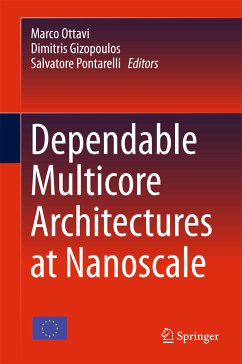The book is composed of three sections, beginning with an introduction to current dependability challenges arising in complex computing systems implemented with nanoscale technologies, and of the effect of the application scenario.
The second section details all the fault-tolerance techniques that are applicable in the manufacture of reliable advanced computing devices. Different levels, from technology-level fault avoidance to the use of error correcting codes and system-level checkpointing are introduced and explained as applicable to the different application scenario requirements.
Finally the third section proposes a roadmap of future trends in and perspectives on the dependability and manufacturability of advanced computing systems from the special point of view of industrial stakeholders.
Dependable Multicore Architectures at Nanoscale showcases the original ideas and concepts introduced into the field of nanoscale manufacturing and systems reliability over nearly four years of work within COST Action IC1103 MEDIAN, a think-tank with participants from 27 countries. Academic researchers and graduate students working in multi-core computer systems and their manufacture will find this book of interest as will industrial design and manufacturing engineers working in VLSI companies.
Dieser Download kann aus rechtlichen Gründen nur mit Rechnungsadresse in A, B, BG, CY, CZ, D, DK, EW, E, FIN, F, GR, HR, H, IRL, I, LT, L, LR, M, NL, PL, P, R, S, SLO, SK ausgeliefert werden.









